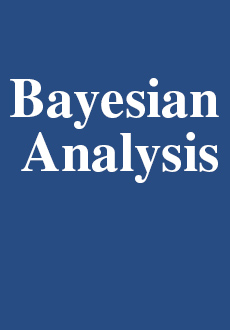Abstract
Approximate Bayesian Computation (ABC) methods are increasingly used for inference in situations in which the likelihood function is either computationally costly or intractable to evaluate. Extensions of the basic ABC rejection algorithm have improved the computational efficiency of the procedure and broadened its applicability. The ABC – Population Monte Carlo (ABC-PMC) approach has become a popular choice for approximate sampling from the posterior. ABC-PMC is a sequential sampler with an iteratively decreasing value of the tolerance, which specifies how close the simulated data need to be to the real data for acceptance. We propose a method for adaptively selecting a sequence of tolerances that improves the computational efficiency of the algorithm over other common techniques. In addition we define a stopping rule as a by-product of the adaptation procedure, which assists in automating termination of sampling. The proposed automatic ABC-PMC algorithm can be easily implemented and we present several examples demonstrating its benefits in terms of computational efficiency.
Acknowledgments
The authors thank IT-University of Helsinki and Yale’s Center for Research Computing for the computational resources provided to execute the analyses of the present work. U. Simola was supported by the Academy of Finland grant no. 1316602. J. Corander was supported by the ERC grant no. 742158. The authors are grateful for the comments and feedback from the anonymous associate editor and referees, which significantly helped to improve this work.
Citation
Umberto Simola. Jessi Cisewski-Kehe. Michael U. Gutmann. Jukka Corander. "Adaptive Approximate Bayesian Computation Tolerance Selection." Bayesian Anal. 16 (2) 397 - 423, June 2021. https://doi.org/10.1214/20-BA1211
Information





